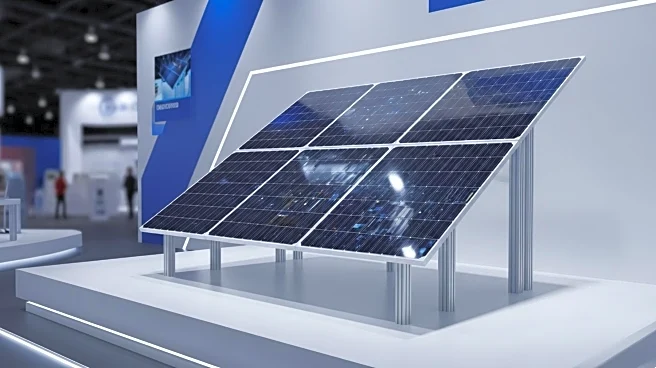What's Happening?
Avaada Electro, a division of the Avaada Group specializing in solar photovoltaic (PV) manufacturing, is set to exhibit its latest N-Type TOPCon cells and high-efficiency modules at the RE+ 2025 event in Las Vegas. The company currently operates with a production capacity of 8.5 gigawatts across its facilities in Uttar Pradesh and Maharashtra, India. These facilities are designed for scalability, with the flagship Nagpur facility featuring advanced production lines and a smart energy management system. The RE+ 2025 event is a significant platform for Avaada Electro to demonstrate its technological advancements and expand its presence in the renewable energy sector.
Why It's Important?
The participation of Avaada Electro in RE+ 2025 highlights the growing importance of renewable energy solutions in the global market, particularly in the United States. By showcasing its advanced solar PV modules, Avaada Electro aims to attract potential clients and partners, thereby expanding its market reach. This development is crucial for the U.S. renewable energy industry, as it provides access to cutting-edge solar technology that can enhance energy efficiency and sustainability. The event also underscores the increasing collaboration between international companies and the U.S. market, fostering innovation and competition in the renewable energy sector.
What's Next?
Following the exhibition at RE+ 2025, Avaada Electro may seek to establish partnerships with U.S.-based companies and stakeholders interested in adopting its solar technology. The company could also explore opportunities to expand its manufacturing capabilities or establish new facilities in the U.S. to cater to the growing demand for renewable energy solutions. Additionally, the event may lead to increased interest from investors and policymakers, potentially influencing future energy policies and investments in solar technology.
Beyond the Headlines
The exhibition of Avaada Electro's solar PV modules at RE+ 2025 could have broader implications for the renewable energy landscape. It may encourage other international companies to enter the U.S. market, increasing competition and driving innovation. Furthermore, the focus on high-efficiency solar technology aligns with global efforts to reduce carbon emissions and combat climate change, highlighting the ethical and environmental significance of such advancements.









